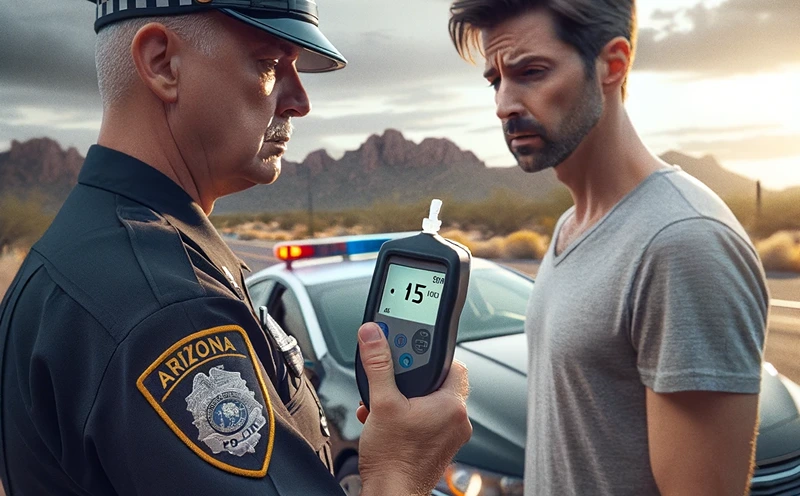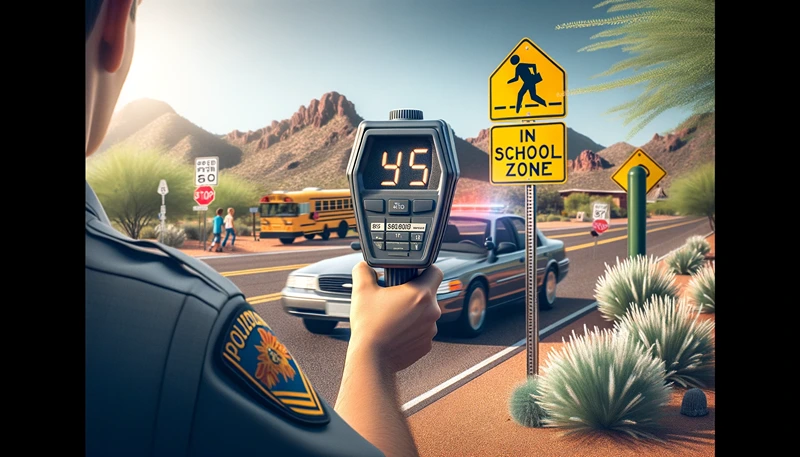Have you recently been pulled over for driving at an excessive speed in Arizona? Arizona is known for its strict enforcement of traffic laws, particularly when it comes to speeding violations. Depending on the severity of the offense, you may have received a civil speeding violation or even a criminal speeding violation.
In Arizona, exceeding the speed limit by a certain amount can result in a criminal conviction, which can have serious consequences. If you have been charged with a criminal speeding violation, it is important to seek legal counsel. A skilled attorney like Arja Shah can work to minimize the penalties you may be facing.
This article will cover the following topics:
- How Does Arizona Law Define Criminal Speed
- How Long Does a Criminal Speeding Ticket Stay on Your Record in Arizona?
- Can you do Traffic School for a Criminal Speeding Ticket in Arizona?
- Penalties for Criminal Speeding
- Potential Defenses to Criminal Speeding Charge
- Contact an Arizona Criminal Defense Attorney
How Does Arizona Law Define Criminal Speed
Under the Arizona Revised Statutes, specifically ARS 28-701.02, the definition of criminal speeding is detailed and clear. The law sets out specific circumstances under which speeding is considered not merely a traffic infraction but a criminal act.
According to this statute:
- A person shall not exceed thirty-five miles per hour approaching a school crossing.
- In business or residential districts, a person shall not exceed the posted speed limit by more than twenty miles per hour. If there is no speed limit posted, the maximum speed should not exceed forty-five miles per hour.
- For locations outside of business or residential districts, a person shall not exceed the posted speed limit by more than twenty miles per hour. This provision applies to less populated or rural areas.
Furthermore, the statute clarifies the legal repercussions of violating these rules:
- A person who violates any part of subsection A is guilty of a class 3 misdemeanor.
- Importantly, if a person is charged under this section for criminal speeding, they cannot simultaneously be issued a civil complaint for a violation of section 28-701 based on the same conduct. This part ensures that a driver does not face double jeopardy or redundant charges for the same speeding incident.
How Long Does a Criminal Speeding Ticket Stay on Your Record in Arizona?
In Arizona, a criminal speeding ticket, classified as a Class 3 misdemeanor, can significantly affect your record. Unlike points from civil traffic violations that typically disappear from your driving record after twelve months, a criminal speeding charge remains on your criminal record indefinitely.
While the immediate impact on your driving privileges may fade after a year, the misdemeanor itself does not automatically vanish from your criminal history. This can influence employment, insurance rates, and more for years to come. Each sector, like insurance companies, may review your driving history for varying lengths of time, usually between three to five years.
It’s important to understand that while the direct consequences to your driving record are temporary, the broader impacts of a misdemeanor charge can linger. Legal avenues, such as expungement or setting aside the conviction, exist but require specific conditions to be met. Engaging with an experienced attorney can provide guidance on mitigating the long-term effects of a criminal speeding ticket in Arizona.
Can you do Traffic School for a Criminal Speeding Ticket in Arizona?
In Arizona, traffic school is often used as a way to mitigate the consequences of civil traffic infractions, helping drivers avoid points on their driving records and sometimes reducing fines. However, the situation differs significantly when it comes to criminal speeding tickets.
Criminal speeding in Arizona is considered a Class 3 misdemeanor under ARS 28-701.02, distinguishing it from lesser, civil traffic violations. Due to its criminal nature, the options for dealing with a criminal speeding ticket are more limited compared to standard speeding tickets.
Typically, traffic school is not available as an option to dismiss a criminal speeding charge in Arizona.
This is primarily because the offense is classified within the criminal rather than civil realm, and the educational remediation offered by traffic school is not deemed sufficient to address the severity of the violation.
However, outcomes can vary depending on the specifics of the case and the jurisdiction. In some instances, particularly for first-time offenders or under certain conditions, a judge might offer the option of attending defensive driving school as part of a plea agreement or sentencing. This is not a standard option and should not be expected in every case.
Penalties for Criminal Speeding
Criminal speeding in Arizona is not taken lightly and carries a set of penalties that reflect the seriousness of the offense.
Here are the potential penalties for criminal speeding in Arizona:
- Fines and Fees: Those found guilty of criminal speeding can face substantial fines. While the exact amount can vary based on the court and the specific circumstances of the case, fines can reach up to $500, not including court costs and surcharges.
- Jail Time: Criminal speeding is one of the few traffic violations that can result in jail time. Although not always applied, the law allows for up to 30 days of incarceration for those convicted of this offense.
- Points on Driving Record: A criminal speeding conviction results in three points being added to your driving record. Accumulating points can lead to increased insurance rates and, if enough points are accumulated, the suspension of your driving privileges.
- Criminal Record: Unlike civil traffic infractions, criminal speeding results in a criminal record. This can have long-term implications for employment, housing, and other areas of life where a criminal background check may be performed.
- Probation: In some cases, individuals convicted of criminal speeding may be placed on probation, requiring them to meet certain conditions such as regular check-ins, community service, or attending driving courses.
- Driver’s License Suspension: While not automatic, in certain circumstances or in combination with other violations, criminal speeding can lead to the suspension of your driver’s license.
It’s important to understand that these penalties can vary based on factors such as the driver’s speed, previous driving record, and the presence of other aggravating circumstances. Furthermore, the actual application of these penalties can vary from case to case, depending on the discretion of the judge and the specifics of the incident.
Potential Defenses to Criminal Speeding Charge
When faced with a criminal speeding charge in Arizona, it’s important to understand that there are several potential defenses that can be utilized. These defenses can vary based on the specifics of the case, including the circumstances of the alleged offense and the evidence presented by the prosecution. Here are some common defenses to a criminal speeding charge:
Accuracy of Speed Measurement
➤One of the most common defenses involves questioning the accuracy of the method used to determine the vehicle’s speed. This could include challenging the calibration and maintenance records of radar or laser devices, or disputing the qualifications of the officer using the equipment.
Mistake of Fact
➤In certain situations, a driver may be able to argue that a genuine mistake led to the speeding incident. For example, if speed limit signs were missing, obscured, or recently changed, it may be possible to argue that the driver was unaware of the correct speed limit.
Emergency Situations
➤If speeding occurred due to an emergency, such as rushing someone to the hospital, this could potentially be used as a defense. However, the nature of the emergency and the necessity of the speed will be closely scrutinized.
Lack of Identification
➤In cases where the driver of the speeding vehicle was not clearly identified (for example, if the citation was based on photo radar), it may be possible to challenge the assumption that the defendant was the person driving at the time of the offense.
Road Conditions and Surroundings
➤Sometimes, the specific conditions of the road and surroundings at the time of the alleged offense can be used in the driver’s defense. This could include arguing that the speed was safe given the current traffic, weather conditions, or other relevant factors.
Constitutional Violations
➤If there were any violations of the driver’s constitutional rights during the stop or arrest, such as lack of probable cause for the traffic stop, these could form the basis for a defense.
It’s important to note that while these defenses can be effective, their applicability and likelihood of success depend on the specifics of each case. Therefore, it’s important for individuals charged with criminal speeding to consult with an experienced Arizona criminal defense attorney. An attorney can evaluate the details of the case, advise on the best defense strategy, and represent the defendant’s interests in court.
Contact an Arizona Criminal Defense Attorney

To contact Arja Shah, you can call at (602) 560-7408. This line is available for immediate help and to set up an initial consultation. You can also reach out for emergency help if needed. The Shah Law Firm is known for providing affordable and aggressive DUI representation, and they have successfully defended over 3,000 clients in Arizona facing various charges, ensuring personalized and effective legal counsel.











